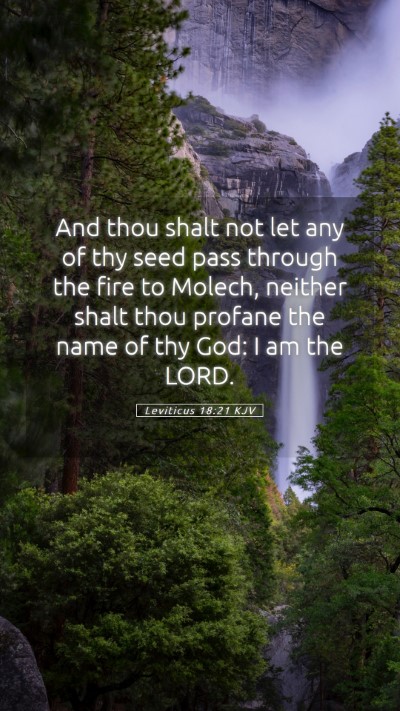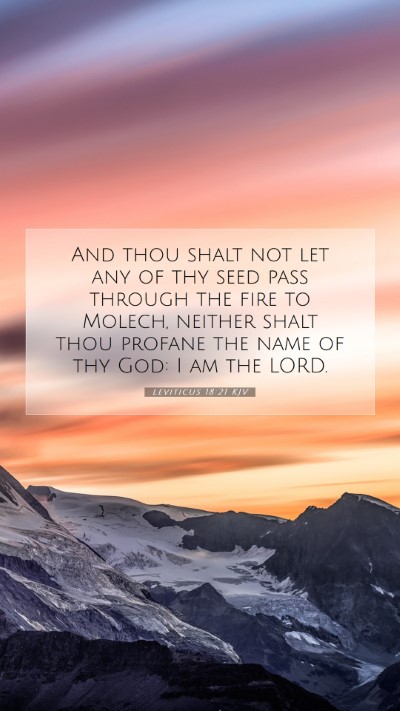Bible Verse Meaning and Commentary: Leviticus 18:21
Verse: "And thou shalt not let any of thy seed pass through the fire to Molech, neither shalt thou profane the name of thy God: I am the Lord." - Leviticus 18:21 (KJV)
This verse is part of a broader section in the Book of Leviticus that lays out laws concerning sexual morality and idolatry. Leviticus 18 discusses various prohibited sexual practices, setting a clear distinction between the behaviors of the Israelite people and the customs of surrounding nations. In this context, Leviticus 18:21 specifically addresses the abhorrent practice of child sacrifice to the idol Molech, which was prevalent among certain pagan cultures of the time.
Insights from Public Domain Commentaries
Matthew Henry's Commentary
Matthew Henry highlights the serious nature of the prohibition against sacrificing children to Molech, emphasizing the importance of protection for the innocent. He notes that this act was an abhorrence to God and a violation of the value of life that God has bestowed upon humanity. Henry further explains that the command reflects God's desire for His people to be set apart, noting that reliance on idols for assistance, especially in dire situations, is contrary to true worship.
Albert Barnes' Notes
Albert Barnes stresses the moral implications of this commandment, where he points out the innate cruelty and the moral degradation associated with idol worship and child sacrifice. He indicates that the phrase "passing through the fire" symbolized a complete surrender of loyalty to these false gods, and contrastingly, the divine declaration "I am the Lord" serves as a reminder of Yahweh's sovereignty and unique role as the true God. Barnes also emphasizes the connection between worship and ethical living, which informs how believers should conduct their lives.
Adam Clarke's Commentary
Adam Clarke provides a precise historical context for understanding this scripture, explaining the practice of Molech worship involved children being offered as sacrifices. Clarke emphasizes that such a ritual was not only alarming but indicative of a society devoid of moral compass. He reminds readers that such practices were considered pure blasphemy before God. Clarke also elaborates on the significance of not profaning God’s name, reflecting that any association with these heinous acts directly undermines the holiness and righteousness of God.
Understanding the Verse
Among the central themes present in Leviticus 18:21 is the sanctity of life and a call to reject both idolatry and the associated immoral practices of surrounding nations. The verse illustrates how inward devotion must align outward conduct, reflecting a lifestyle that upholds God's commandments and acknowledges His authority. In contemporary application, this scripture urges believers to consider the seriousness of idol worship in any form and to affirm their commitment to God without compromise.
Related Bible Cross References
- Jeremiah 32:35 - Discusses the detestable practices of child sacrifice.
- Deuteronomy 12:31 - Warns against offering children as sacrifices to idols.
- 1 Kings 11:7 - Addresses the worship of Molech in relation to Solomon's failure.
- Leviticus 20:2-5 - Further elaboration on the repercussions for engaging in Molech worship.
- Acts 7:43 - References the worship of Molech and relates it to Israel's disobedience.
Conclusion
In conclusion, Leviticus 18:21 offers profound insights into biblical morality, the sanctity of life, and the danger of idolatry. Through an understanding of this verse, one can gain clarity on the expectations for living a life that honors God, encourages ethical conduct, and shuns practices that are contrary to divine law. This verse serves as a critical reminder for those engaging in personal Bible study, prompting further exploration into the implications of such prohibitions as illustrated throughout scripture.
Further Study and Reflection
For individuals seeking a deeper understanding of this verse and its applications in life, participating in Bible study groups or utilizing various online Bible study resources can be beneficial. Engaging with Bible study tools and guides may enhance one’s comprehension of scripture, offering insights into historical context and **thematic connections**. Beyond individual reflection, discussing and analyzing scripture in a group setting often leads to a more robust understanding of the meanings of Bible verses.
SEO Keywords
By focusing on terms such as bible verse meanings, bible verse explanations, and other related keywords, this exploration enriches one’s approach to bible study insights and implements effective scripture analysis. As believers apply these insights to their daily lives, they gain not only knowledge but also wisdom in their spiritual journey.


